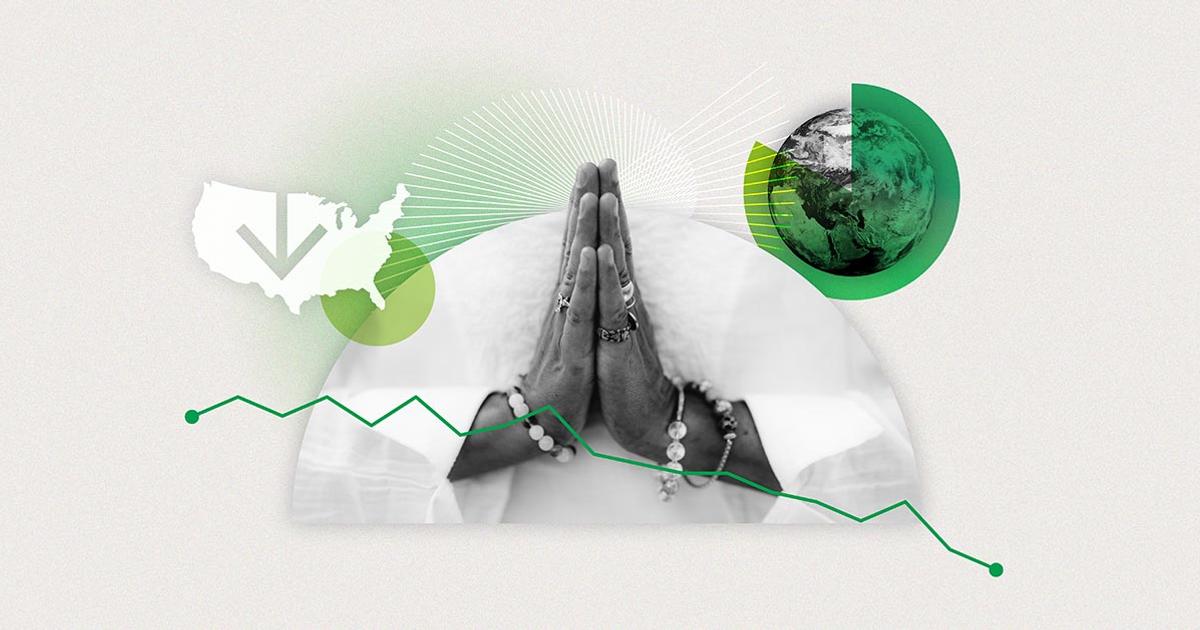Religion still more important in U.S. than in many OECD countries
WASHINGTON, D.C. — The 17-point drop in the percentage of U.S. adults who say religion is an important part of their daily life — from 66% in 2015 to 49% today — ranks among the largest Gallup has recorded in any country over any 10-year period since 2007.
About half of Americans now say religion is not an important part of their daily life. They remain as divided on the question today as they were last year.
Such large declines in religiosity are rare. Since 2007, only 14 out of more than 160 countries in the World Poll have experienced drops of over 15 percentage points in religious importance over any 10-year period.
Only a small number of mostly wealthy nations have experienced larger losses in religiosity, including Greece from 2013-2023 (28 points), Italy from 2012-2022 (23 points), and Poland from 2013-2023 (22 points). Other countries, including Chile, Türkiye and Portugal, have seen declines similar in magnitude to the U.S. decline.
As religiosity has declined in the U.S., the gap between the U.S. and the global median has widened. The global median for religiosity has remained stable for nearly two decades, averaging 81% since 2007 and reaching 83% last year, the most current full-year data available.
At the same time, attitudes in the U.S. are drawing closer to those in other advanced economies. Across the 38 OECD (Organisation for Economic Co-operation and Development) countries in 2024, a median of 36% of adults said religion is important to their daily lives. The gap between the U.S. and the median for these countries is now narrower than at any point in Gallup’s trend.
The long-term decline in religiosity places the U.S. in a unique position on the global religious landscape. Most countries fall into one of four patterns: high religiosity with Christian identity; high religiosity with another religious identity (often Muslim majority, although there are several countries in the Middle East where Gallup does not ask religious identity questions); low religiosity with Christian identity; or low religiosity with no religious identity.
The U.S. no longer fits neatly into any of these categories, having a medium-high Christian identity but middling religiosity. In terms of religious identity, the percentage of Americans now identifying as Christian is similar to those of Western and Northern European countries such as the United Kingdom, Germany, Finland and Denmark, nations with strong Protestant traditions. Yet religion continues to play a larger role in daily life for Americans than for people in those countries.
Conversely, the importance of religion in daily life in the U.S. resembles that of countries such as Argentina, Ireland, Poland and Italy — where Catholicism is more influential — but significantly fewer Americans now identify as Christian compared with those populations.
This marks a shift from 2008, when Gallup began consistently tracking people’s religious identity and religion’s role in daily life in most of the world. At that time, the U.S. aligned more closely with countries where religion was widely practiced and most adults identified as Christian.
The steady decline in U.S. religiosity over the past decade has been evident for years. Fewer Americans identify with a religion, church attendance and membership are declining, and religion holds a less important role in people’s lives than it once did. But this analysis of World Poll data puts the decline in a wider context, showing just how large the shift has been in global terms. Since 2007, few countries have measured larger declines in religiosity.
This means the U.S. lags further behind the global median for religiosity and is drawing closer to the median for other advanced economies. The U.S. increasingly stands as an outlier: less religious than much of the world, but still more devout than most of its economic peers.
Stay up to date with the latest insights by following @Gallup on X and on Instagram.
For complete methodology and specific survey dates, please review Gallup's Country Data Set details. Learn more about how the Gallup World Poll works.
These results are based on telephone interviews conducted June 14-July 16, 2025, with 1,000 U.S. adults aged 15 and older.
For results based on the overall sample, the margin of sampling error is ±4.4 percentage points at the 95% confidence level. All reported margins of sampling error include computed design effects for weighting.
In addition to sampling error, question wording and practical difficulties in conducting surveys can introduce error or bias into the findings of public opinion polls.
Subscribe to the Front Page newsletter for insights on the world’s most pressing topics.
(*) Required
This site is protected by reCAPTCHA and the Google Privacy Policy and Terms of Service apply.
Search, examine, compare and export nearly a century of primary data.
Thirty-four percent of Americans say religion is increasing its influence on American life, up from 20% a year ago.
More than one in five U.S. adults have no religious preference, while close to seven in 10 are Christian, primarily Protestant (45%) or Catholic (21%).
Most Americans have a religious preference — predominantly a Christian one — but less than half say religion is “very important” to them.
Three in 10 Americans, but 67% of Mormons, attend church regularly. Most religious groups show declines in attendance over the past two decades.
Gallup https://news.gallup.com/poll/697676/drop-religiosity-among-largest-world.aspx
Gallup World Headquarters, 901 F Street, Washington, D.C., 20001, U.S.A
+1 202.715.3030
